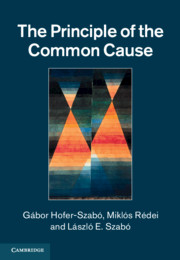Book contents
- Frontmatter
- Contents
- Preface
- 1 Introduction and overview
- 2 The Common Cause Principle
- 3 Common cause extendability of probability spaces
- 4 Causally closed probability theories
- 5 Common common causes
- 6 Common cause extendability of nonclassical probability spaces
- 7 Reichenbachian common cause systems
- 8 Causal closedness of quantum field theory
- 9 Reichenbach's Common Cause Principle and EPR correlations
- 10 Where do we stand?
- Appendix
- References
- Index
7 - Reichenbachian common cause systems
Published online by Cambridge University Press: 05 June 2013
- Frontmatter
- Contents
- Preface
- 1 Introduction and overview
- 2 The Common Cause Principle
- 3 Common cause extendability of probability spaces
- 4 Causally closed probability theories
- 5 Common common causes
- 6 Common cause extendability of nonclassical probability spaces
- 7 Reichenbachian common cause systems
- 8 Causal closedness of quantum field theory
- 9 Reichenbach's Common Cause Principle and EPR correlations
- 10 Where do we stand?
- Appendix
- References
- Index
Summary
Common cause partitions
Confronted with a common cause incomplete probability space (X, S, p)in which a direct causal influence between the correlated events is excluded, one can have in principle two strategies aiming at saving the Common Cause Principle: one may try to argue that S is not “rich enough” to contain a common cause, but there might exist a larger probability space (X′, S′, p′) that already contains a common cause of the correlation. As we have seen in Chapter 3 this strategy always works in the sense that it is always possible to enlarge (X, S, p) in such a way that the enlarged probability space already contains an event C that satisfies the Reichenbachian conditions.
Another natural idea is to suspect that the correlation between A and B is not due to a single factor but may be the cumulative result of a (possibly large) number of different “partial common causes,” none of which can in and by itself yield a complete common-cause-type explanation of the correlation, all of which, taken together, can however account for the entire correlation. In this chapter we elaborate this idea by formulating precisely a notion of the Reichenbachian Common Cause System (RCCS) and prove propositions on the existence and features of such systems.
As we have seen in Chapter 2, if the events A, B, C satisfy the Reichenbachian conditions (2.5)–(2.8) then there is a positive correlation between A and B (Proposition 2.5).
- Type
- Chapter
- Information
- The Principle of the Common Cause , pp. 80 - 96Publisher: Cambridge University PressPrint publication year: 2013



